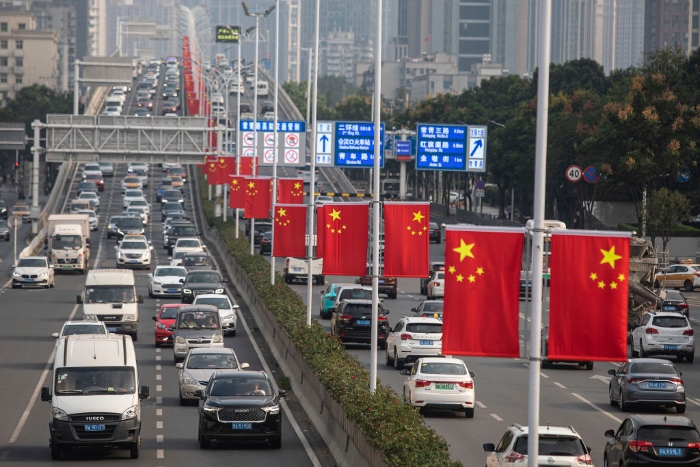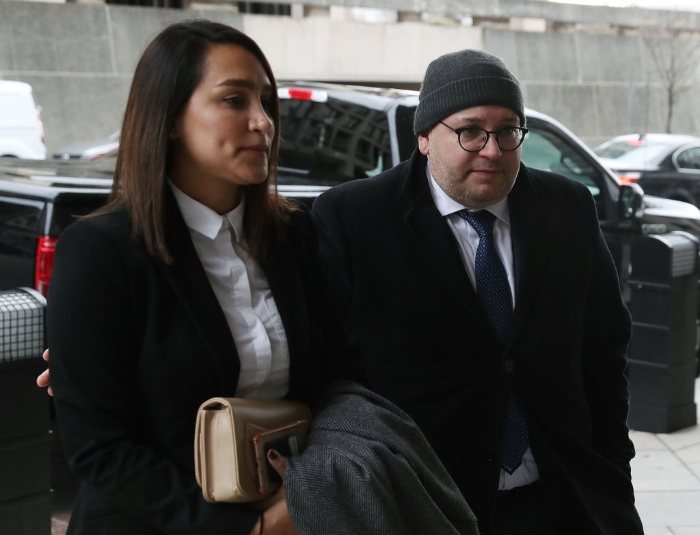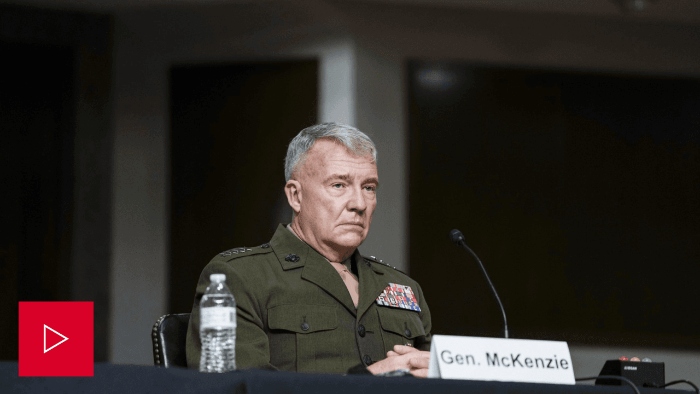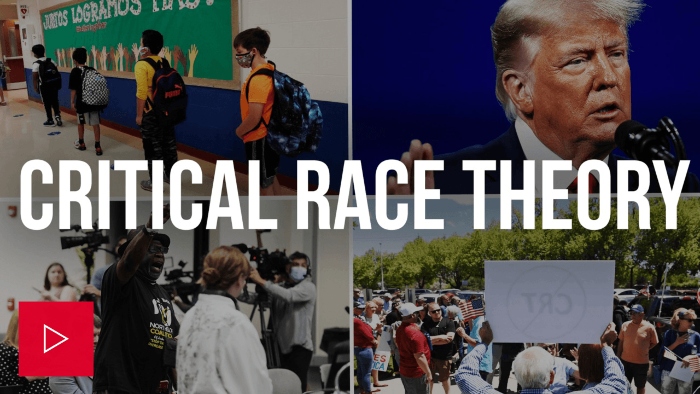| | |  | BY RENUKA RAYASAM | Presented by the American Cancer Society Cancer Action Network | | 
Traffic passes through streets decorated with national flags in Wuhan, China. | Getty Images | ‘BOTH SIDES HAVE TOO MUCH TO LOSE’ — Joint Chiefs Chair Gen. Mark Milley told Congress today that two calls he made to his Chinese counterpart were part of his duties to “prevent war,” a sign of just how precarious the U.S.-China relationship was during former President Donald Trump’s tenure. President Joe Biden hasn’t exactly unraveled his predecessor’s tough-on-China approach, keeping in place Trump-era tariffs and echoing the former president’s rhetoric. Despite Biden’s outward approach, there are signs that he wants to thaw the deep freeze in bilateral relations, China Watcher host Phelim Kine told Nightly today over Slack. In the 1990s Americans were optimistic that bringing China into the economic fold would curb the country’s authoritarian tendencies. But, Phelim said, that decision helped China develop from a rural country to an economic superpower, giving it more economic leverage over the world. Now the potential failure of Chinese real estate giant Evergrande is roiling global markets and spotlighting the debt that fueled China’s growth. Renu and Phelim chatted about the challenging relationship between the two countries. Their conversation has been edited. What did you make of Milley’s testimony today? Milley’s testimony is in a sense historic in that this appears to be the first time ever that a chair of the U.S. Joint Chiefs of Staff has ever had to effectively sidestep the president of the United States to assure a strategic rival or competitor, in this case China, that perceptions of domestic chaos in the U.S. were not in any way a prelude to a possible surprise attack on China. It’s gobsmacking the head of the U.S. military machine was so concerned about China’s People’s Liberation Army perceptions of that risk. This wasn’t quite a repeat of the Cuban Missile Crisis in terms of imminent threat of nuclear holocaust through misunderstanding or miscalculation, but it was a sobering reminder that domestic turmoil in the U.S. can have profoundly dangerous implications in terms of foreign affairs and military risks. What do we know about Biden’s approach to China? Biden recognizes that both sides have too much to lose by maintaining the current hostile status quo, and that prompted him to initiate the outreach to Chinese President Xi Jinping earlier this month. It’s symbolically important because Biden is messaging Xi that he wants a relationship reset of some kind. Or at least a lower-level of bilateral vitriol. And we can see that the resolution of the Meng Wanzhou case and the liberation of the Canadian citizens Michael Kovrig and Michael Spavor, who were essentially detained in China as hostage pawns to help broker Meng’s release. This is diplomacy at its most cravenly transactional, but at the very least it removes a major thorn affecting bilateral relations. What remains to be seen is whether Biden can truly capitalize on his personal relationship with Xi — the two men have spent many hours together in China and the U.S. over the past decade — to actually broker a return to meaningful bilateral cooperation. For years there was this idea that by welcoming China into the economic fold and engaging with them, that the west could reduce the country’s authoritarian tendencies. Has that worked out? There was very much an underlying belief or hope back in the 1990s in the President Clinton era that helping to integrate China into the global economic system would, osmosis-like, help to spur positive changes in China’s one-party authoritarian system. In December 2001 the U.S. granted China Permanent Normal Trading Relations and that same month China entered the WTO. Twenty years later we can clearly see the economic and financial fruits of that opening — China has the world’s second largest economy, millions have been lifted out of poverty, China now boasts more billionaires than the U.S — but China’s authoritarian system is stronger than ever. The CCP has skillfully guided and exploited the opening of its economy to ensure that it gained maximum financial and economic advantage without ceding any political ground. And the Chinese government has channeled huge sums of that wealth into creating the world’s most sophisticated surveillance state. A state in which human rights and the ability of Chinese people to challenge the CCP’s monopoly on power are ruthlessly and systematically crushed. China now has more than 1,000 billionaires. But it also has around one million Uyghur Muslims in concentration camps in Xinjiang as part of the CCP’s conflation of Muslim identity with terrorism and a threat to state power. And the once vibrant international city of Hong Kong has withered politically, culturally and economically following the imposition of a draconian National Security Law in July 2020. Few would have predicted these kinds of negative outcomes back in those heady days of January 2001. Welcome to POLITICO Nightly. Reach out with news, tips and ideas for us at nightly@politico.com. Or contact tonight’s author at rrayasam@politico.com and on Twitter at @RenuRayasam.
| |
| | A message from the American Cancer Society Cancer Action Network: The National Breast and Cervical Cancer Early Detection Program (NBCCEDP) provides lifesaving cancer screenings in low-income communities, but fewer than 2 in 10 eligible individuals received breast or cervical cancer screenings through this critical safety net program. Lawmakers must take action to end this divide in access to cancer prevention, early detection and treatment. Increased funding for the NBCCEDP will help more individuals get the cancer care they need—and help end this alarming divide. | | | | | | 
Former Washington Post reporter Jason Rezaian and his wife Yeganeh Salehi arrive at U.S. District Court for a hearing, on Jan. 8, 2018 in Washington, D.C. | Mark Wilson/Getty Images | EXCLUSIVE LOOK AT NEW JASON REZAIAN POD — In the summer of 2014, when the Obama administration was negotiating the Iran nuclear deal, Washington Post correspondent Jason Rezaian was arrested by Iranian authorities. Iranian guards questioned Rezaian and his wife Yeganeh about a video of Iranian youth dancing to the Pharrell Williams’ song “Happy,” and a Kickstarter campaign Rezaian launched to raise money to bring avocados to Iran. “544 Days” — Rezaian’s new podcast, named for the length of his detention in Iran — released its first three episodes today. The show details the couple’s arrest, which happened in their apartment, the early days of their detention in Tehran’s Evin Prison, notorious for abuses, and their families’ early efforts to free the pair. In the fourth episode, airing next Tuesday, Rezaian talks to John Kerry, Ben Rhodes and other Obama administration officials about how his captivity became linked to the nuclear deal talks. Listen to an exclusive Nightly preview clip.
| | Renu talked to Rezaian about his experiences and what the remaining episodes of “544 Days” will cover. This conversation has been edited. You had been working in Iran for years before your abduction. How prepared — and surprised — were you about the situation you ended up in? The audacity of it was the most surprising and shocking. At that point, in the political geopolitical moment that we were in between Iran and world powers negotiating over the fate of the Iran nuclear deal, there seemed like a genuine desire on the part of the Iranian government to come to an agreement that would lift sanctions off of its economy. The fact that I was working for such a high-profile newspaper, I thought it brought a certain amount of cover. You talk a lot in the podcast about being angry. Who were you angry with? It shifted. Initially it was, “Why isn’t anybody here in Iran that knows I haven’t done anything wrong coming to my aid?” Then it’s, “Why isn’t the American government doing more to get me out more quickly?” Then it’s “Is my newspaper back home doing enough? Is my family doing enough?” When I speak with other families who have loved ones being held hostage in Iran and other places currently or who have been in the past — that anger at the U.S. government, I understand that very well. You won a $180 million judgment against Iran. Why did you sue in the first place? It was a combination of some measure of justice that was denied to me for a year and half, while I was in prison in Iran. I still face an ongoing propaganda campaign by the Islamic Republic. They created a television show that is supposedly about me and all my crimes. It’s clear that they don’t feel any remorse. And, yeah, I’d like it to be a deterrent. We understand that Iran is not going to come out and honor the verdict or the judgment in my case. It’s up to the U.S. government to decide whether or not it’s going to enforce these judgments. There are dozens of former victims of Iran and it amounts to billions of dollars. What should Americans know about Iran? Iran is a second tier power, but one that has been isolated from the world for so long that we just don’t have an accurate picture of what’s going on inside that country. There’s a real yearning for a freer future by the young people in that country. Engaging with Iranian actors shouldn’t be so taboo. There are people in that society that we should be talking to, and we haven’t been. We have very, very, very little insight and human intelligence on Iran and that should be concerning to everybody. Did your captivity change your view of the country? I used to be somebody who said, “Hey, if you’re coming to visit Iran in all likelihood you will be safe and you’ll be welcomed by the people of Iran and you’ll go home with wonderful memories.” I can’t say that anymore, obviously. I also know that I walked out of Iran alive. We have ample examples of journalists and others who’ve been killed in countries that we’re much closer to than Iran and governments that have dispatched killers to other countries to carry out assassinations. I’m not discounting the risk of Iran at all. But that would indicate to me that they aren’t necessarily crazy. It’s something that has been pinned on the leaders of Iran for a very long time: Deranged, abusive, murderous. Yes, all of those things. But also, highly calculated.
| |
| | TELL US WHAT YOU THINK: Do you listen to POLITICO podcasts? We want to hear from you! Tell us what you like, what you could do without, and what you want to see in the future from the POLITICO Audio team! Your responses will help us improve our offerings and tailor our podcast content to better fit your needs. Find the survey here. | | | | | | | | 
| — Top generals contradict Biden, say they urged him not to withdraw from Afghanistan: Top generals told lawmakers under oath today that they advised Biden early this year to keep several thousand troops in Afghanistan — directly contradicting the president’s comments in August that no one warned him not to withdraw troops from the country. The remarkable testimony pits top military brass against the commander-in-chief as the Biden administration continues to face tough questions about what critics are calling a botched withdrawal that directly led to the deaths of 13 American service members, scenes of chaos at the Kabul airport, and the abandonment of American citizens and at-risk Afghans in the war-torn country. — Warren opposes reappointment of Fed’s Powell: Sen. Elizabeth Warren said today she opposes a second term for Federal Reserve Chair Jerome Powell , calling him a “dangerous man” because of the financial regulations that have been loosened during his tenure. “Your record gives me grave concern,” the Massachusetts Democrat told Powell while he was testifying before the Senate Banking Committee. “Over and over, you have acted to make our banking system less safe, and that makes you a dangerous man to head up the Fed. And it’s why I will oppose your renomination.” — Biden opposes changing Senate rules to raise debt limit: The White House said today that Biden opposes changing the filibuster to suspend or raise the debt ceiling, closing off a break-the-glass option to avoid financial calamity. White House press secretary Jen Psaki confirmed that Biden’s position on reforming the filibuster has not changed as Democrats search for options to deal with the approaching debt ceiling deadline amid persistent refusal from Senate Republicans to step in and help. — Confusion over Covid-19 boosters lingers as states roll out shots: States are wrestling with how to dole out Covid-19 boosters after federal regulators set eligibility guidelines so broad that nearly all of the 100 million Americans who received the Pfizer-BioNTech vaccine qualify for a third shot. People age 65 and older, as well as people 18 to 64 with underlying health conditions or jobs that increase their risk of developing severe Covid, are eligible for a third dose, federal health officials said last week. The sheer breadth of qualifying medical conditions and occupations, plus the lack of any proof requirements, means just about anyone who got the Pfizer vaccine can now seek out a booster. The only hard-and-fast rule is that people must wait at least six months after their initial two shots to get a third. — Arbitrator slaps down Trump’s NDA challenge against Omarosa: Trump cannot enforce a nondisclosure agreement with former confidant Omarosa Manigault Newman, an arbitrator ruled late last week. The arbitrator, Andrew Brown, wrote that the terms of the agreement were “vague, indefinite, and therefore void and unenforceable.”
| |
| |  
| | | | | Nightly asks you: Has the Delta variant led you to change you or your family’s Thanksgiving or holiday plans? Use our form to send us your responses, and we’ll include select answers in a future edition.
| |
| | DON’T MISS THIS PLAYBOOK INTERVIEW WITH REP. GOTTHEIMER AS THE HOUSE PREPARES TO VOTE : President Biden's domestic agenda is on the line, with a $1 trillion bipartisan infrastructure bill slated for a House vote on Thursday. However, moderate and progressive Democrats remain at odds over a larger, multitrillion-dollar spending package — with the left even threatening to tank Thursday's vote. Join Playbook co-author Rachael Bade for a virtual conversation featuring Rep. Josh Gottheimer (D-N.J.), the leader of the centrists urging his colleagues to take the win Thursday and continue working on the second package in the coming days. REGISTER HERE. | | | | | | | | |
| | | THE 411 ON CRT — What was widely accepted for decades has now become a contentious political talking point. From local school board meetings to the presidential debate stage, critical race theory and the broader topics of equity and how we teach the nation’s racial history have spurred intense debates and protests. POLITICO’s Michael Cadenhead breaks down how CRT became such a contentious political issue. Watch:
| 
| | |
| | A message from the American Cancer Society Cancer Action Network: For every person who has cervical cancer detected early through the National Breast and Cervical Cancer Early Detection Program (NBCCEDP), nine others don’t have the chance. We must end this divide.
The NBCCEDP provides lifesaving cancer screenings in low-income communities and to uninsured and underinsured Americans, but fewer than 2 in 10 eligible people received breast or cervical cancer screenings through this critical safety net program. Increased funding for the NBCCEDP can help ensure more people get the care they need from the program and may even save states money on treatment costs when cancer is detected at earlier stages.
Tell Congress to take action and prioritize health. Tell Congress to increase funding for the NBCCEDP. | | | Did someone forward this email to you? Sign up here. | |
|
| | Follow us on Twitter | | | FOLLOW US
|
| |
